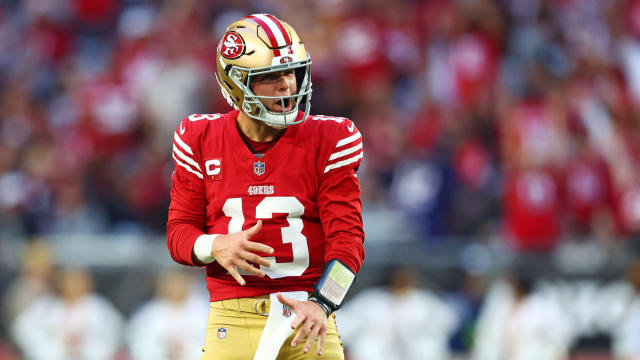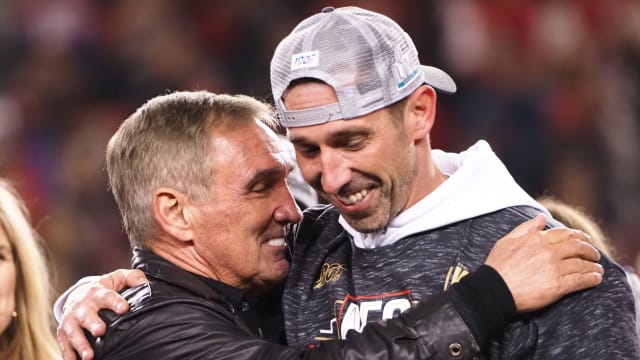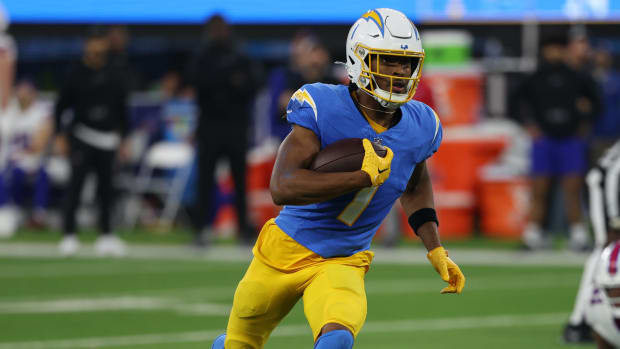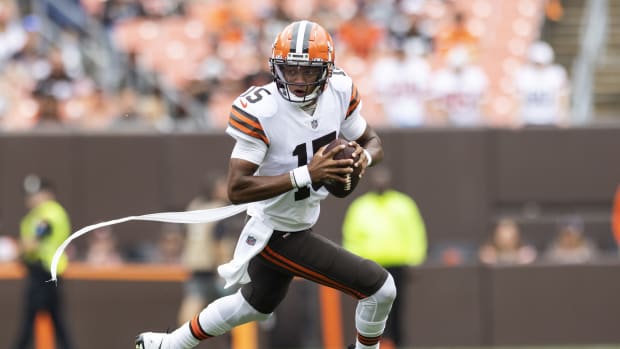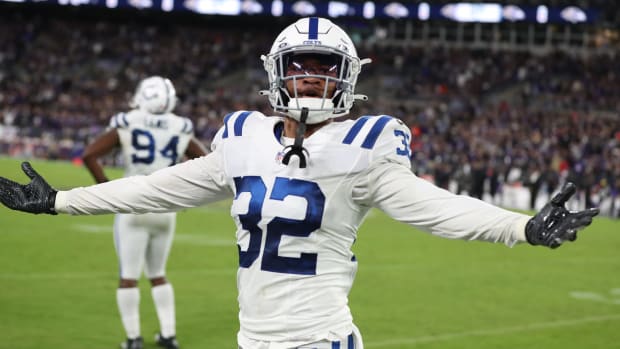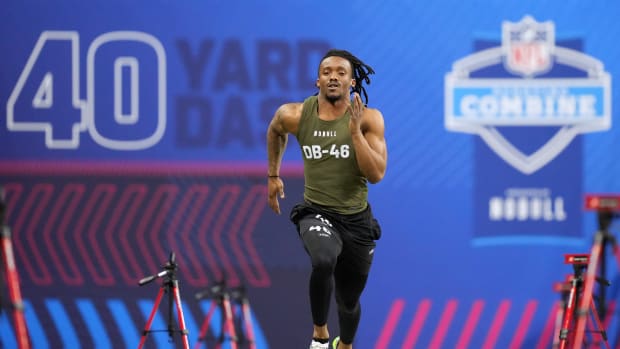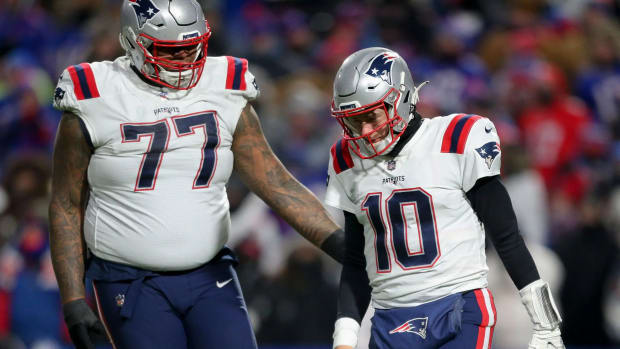Super Bowl LVIII Newsletter: Brock Purdy and the Great System Quarterback Debate
Of all the most common Purdy misconceptions, the one that bothers those who know him most centers on his lack of athleticism. Those misconceptions aren’t overblown. They’re just not true. Now, none of those Purdy defenders are saying he will one day win gold in the Olympic decathlon. But he is an athlete, always has been. Just because he looks like he should be dwelling in cubicles doesn’t mean the baseline of speed, agility and more is going to change. It didn’t when he went to the combine as an afterthought; didn’t when he became the best-ever Mr. Irrelevant; didn’t during the UCL rehabilitation process last spring.
Objective data and consistent scores on relevant metrics should have ended these deluded beliefs ahead of the Super Bowl. Purdy always excelled at “short-area quickness,” whether in shuttle runs, three-cone drills or, you know, actual football games. “He started putting out numbers where you’re like, wow, this guy’s short-yardage, change-of-direction speed is similar to, basically, a running back,” his orthopedist/trainer Tom Gormely says. “He can shift. He can move. He’s explosive in that box.”

Purdy used his athleticism and running ability to seal the 49ers’ NFC championship game victory over the Lions.
Kelley L Cox/USA TODAY Sports
In offseasons, Purdy devotes more time than most signal-callers to ensuring his first three steps—in any direction—are as explosive as possible. One easy way to view it: at the combine, where such tests are standardized, he covered 10 yards from a standing position in 1.54 and 1.55 seconds. That’s fast and not just fast, but central to his skillset. Purdy’s initial burst allows him to evade pass rushers when necessary, sprint downfield when possible and, most importantly, throw darts while on the run. None of these qualities qualify Purdy as a game manager in the classic derogatory sense. If anything, all speak to the opposite, if the arguments center on stylistic differences between QBs.
To further build his argument, Gormely cites a recent conversation with Indianapolis Colts rookie Anthony Richardson, who’s generally and fairly regarded as one of the best athletes on the planet. Richardson also happens to play quarterback. He’s currently rehabbing an injury with Gormely. Richardson, according to Gormely, is impressed with Purdy’s athleticism. Speed recognize speed, or some such. “I don’t understand this narrative,” Richardson told Gormely. “Aren’t we supposed to be system QBs? Aren’t I supposed to play inside my system?”
That’s precisely the point Gormely is making. The problem with that point is logic. Not what metrics say, but what most see when they look at Purdy. Something like their friendly neighborhood accountant. Gormely points to Lamar Jackson, another quarterback whose athleticism ranks among his defining characteristics. His 10-second split was also 1.54. “Lamar is a hyper-system quarterback,” Gormely says, and he means that as a compliment. “The system was built around Lamar’s skillset. That’s why they’re successful.”
This discourse is just … dumb. Purdy’s best times in the 20-yard shuttle drill landed between 4.39 and 4.45 seconds. The best-ever times for a quarterback who started in the NFL belong to Pittsburgh Steelers signal-caller Kenny Pickett, who posted a 4.29. Defensive backs have run slower shuttles than Purdy does and not been criticized for lacking athleticism.
Same vein: Few would ever argue that Patrick Mahomes, softening dad bod notwithstanding, is anything less than freakishly athletic. Well, Mahomes ran a 4.84-second 40-yard dash at the combine. Purdy ran the exact same time. Richardson, an athlete so freakish Gormely posits he’s the most athletic person in all of sports, was clocked at a freakishly fast 1.51 seconds for the first 10 yards of his 40, which was only a fraction faster than Purdy’s time (four-hundredths of a second better). Christian McCaffrey posted the exact same 10-yard split as Purdy. Jackson (!) recorded a 1.52.
Purdy clocked 20-yard splits between 2.70 and 2.73 seconds. These also are indicative. They show where Purdy’s speed limitations actually do start. His splits for 10 yards project, in a typical runner, something in the range of a 4.4-second 40-yard dash. His splits for 20 yards project a time around 4.6. Which means, Gormely says, that Purdy owns elite quickness, but not necessarily elite top-end speed. Relevant questions must be asked here.
Which type matters more for playing football? And which matters more for quarterbacks playing football? The answer is the same for both: quickness. The importance of that quality cannot be overstated. Bursts allow for fewer sacks and heightened creativity, which is basically how the same general public that sees Mahomes as an elite athlete looks at Purdy as a nerd who can throw footballs. “That is athleticism at the quarterback position,” Gormely says. “It’s very similar to Patrick. He’s just fast enough, just explosive enough. He makes enough people miss to deliver the ball downfield. But Patrick is dynamic. And Brock’s not?”
Gormely believes the average football fan simply cannot see what makes Purdy special, even in the game-manager sense. Between his processing speed, his arm talent and those 10 yards of glorious quickness, he can manipulate elite defenses. Throw in teammates like McCaffrey, George Kittle, Deebo Samuel and the rest—which is, only, the whole point—and the Niners’ offense speeds and scores because of Purdy, not in spite of him.

Purdy (second from left) is joined by an elite cast of playmakers, including McCaffrey, Kittle and Samuel on offense.
Kyle Terada/USA TODAY Sports
Detractors might pivot at that point to Shanahan’s brilliance, every route and throw mapped with maniacal precision. Statistics instantly render that debate fictional, too. This season, Purdy averaged 9.6 yards per throw, up 1.5 yards from his rookie campaign. Mahomes, meanwhile, averaged 7.0 yards per attempt (YPA) and has never averaged more than his 8.8 YPA from the Chiefs’ first championship run. Which isn’t to say Purdy throws a better football than Mahomes does. But which is to say he’s viewed through a far more despicable, delusional, don’t-let-the-facts-get-in-the-way-of-a-bad-take lens.
Maybe juxtapositions matter here. Maybe context does. Mahomes rules an entire country of football obsessives. Purdy splits his sky-high, northern California rent with a teammate whose fiancé lives with them. Purdy complains about his share, even. In some ways, he’s forever the player whose own mother encouraged him to formulate a backup plan as recently as less than two years ago. Only now, even Tom Brady is lauding Purdy, his play and all that his first season-plus projects. Only now, Purdy’s also the same player whose Wikipedia page has morphed into a referendum on all that ails modern society, with more edits, according to a recent and delightfully insightful SF Gate analysis, than any other NFL player since Dec. 2022.
“It’s obvious that Shanahan essentially has the key to his offense with Brock,” says Purdy’s private coach, Will Hewlett. “He has the guy that’s able to operate it the way he wants. The great thing about the Shanahan offense is all the little setups that really build for later.”
Perhaps all this centers, then, on two men: the genius coach and his latest protégé, the one who exudes Rudy vibes en route to a top five league MVP finish. In this binary debate, either Shanahan should be credited for the San Francisco 49ers’ success or Purdy should. The problem is that argument begins with a false construct, disallowing a more obvious third option based on things like facts.
What if both instead offered exactly what the other needed?
Then to now
This is Dallas Cowboys offensive coordinator Brian Schottenheimer, on the time his father, Marty, spent coaching Kansas City.
“The last two weeks have just been just brutal, to think about all the amazing things we did, and yet, we came up short when we didn’t play well. You gotta own that. But as you get further and further away from it, you begin to calm down, begin to decompress.”
On background
Guess which matchup 49ers’ sources like the most, especially after the Chiefs lost two important members of their defensive line to injuries in the AFC championship game against the Ravens. “Run the ball and win,” one said.
Quote without context
“McLovin’.” — From two people who work for the 49ers, or intimately know one of their best players.
Context
Both were answering who might play Purdy in a future movie about his career, this stretch and, maybe, the Super Bowl he could win this season.

































